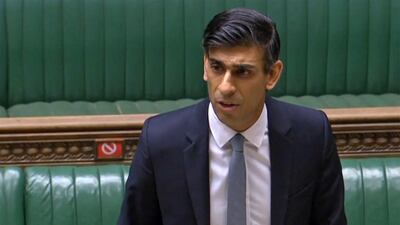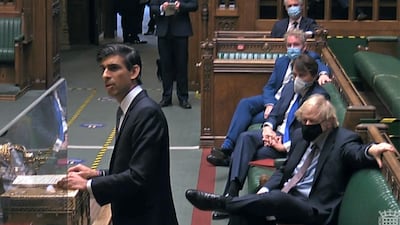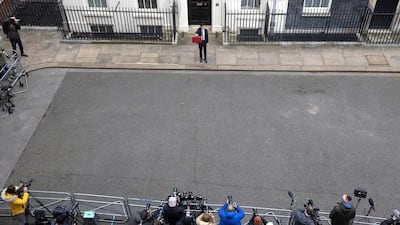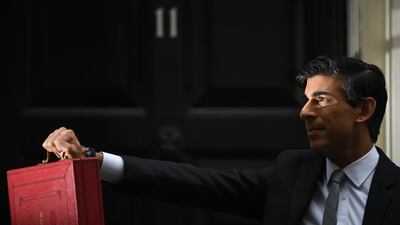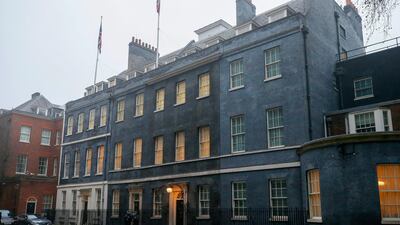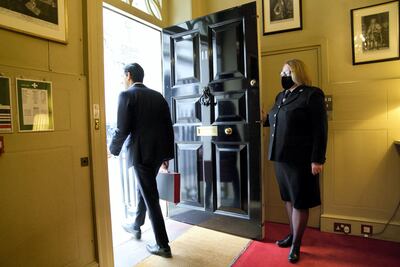UK Finance Minister Rishi Sunak said the Covid-19 damage to Britain's economy is “acute” as he unveiled a three-part budget plan to protect jobs and businesses affected by the pandemic, start the process of cutting the UK’s vast deficit and invest in the future.
With the country still under lockdown measures, Mr Sunak said that safeguarding jobs will remain his priority for the coming months because the crisis has “fundamentally altered” many lives.
He vowed to do "whatever it takes" to boost the economy, including an extension to the jobs rescue plan, as well as the stamp duty holiday for property investors and the business rates exemption for retail, hospitality and leisure businesses.
This amounts to an extra £65 billion ($90bn) in Covid support measures, taking total fiscal support for the crisis for this year and next to £407bn.
“Coronavirus has caused one of the largest, most comprehensive and sustained economic shocks this country has ever faced”, Mr Sunak said, with more than 700,000 people losing their jobs since March last year and the economy slumping by 10 per cent – the most in 300 years.
“We are using the full fiscal firepower to protect jobs and livelihood,” he said.
Mr Sunak has already racked up Britain's highest borrowing since the Second World War, which hit an estimated £355bn or 17 per cent of gross domestic product in the 2020/21 financial year.
With the deficit in the 2021/22 financial year starting in April expected to be £234bn, or 10.3 per cent of GDP, Mr Sunak said steps must be taken to tackle high escalating debt levels and fix public finances.
“It’s going to be the work of many governments over many decades to pay it back,” Mr Sunak. “When crises come, we need to be able to act and we need the fiscal freedom to act.”
Despite low interest rates, Mr Sunak said they may not stay low forever, so he pledged two tax changes to help address the debt.
The first involved freezing personal tax thresholds, which will be increased to £12,570 and £50,270 next year and frozen until April 2026.
The second measure increases corporation tax to 25 per cent from its current level of 19 per cent, which will still see Britain still having the lowest rate in the Group of Seven countries.
While increases will bring the UK tax burden to levels not seen for half a century, according to the OBR, when Labour's Roy Jenkins was finance minister, Mr Sunak told a press conference the tax rises were "fair".
The threshold freeze on income tax will see those on lower incomes paying less than those on higher incomes, he said, while the corporation tax increase will only affect "the largest, most successful companies" with seven in 10 businesses unaffected.
Mr Sunak said borrowing will fall to 4.5 per cent of GDP in 2022/23, 3.5 per cent in 2023/24 then 2.9 per cent and 2.8 per cent in the following two years, due to the action he is taking.
"That means growth is faster, unemployment lower, wages higher, investment higher, household incomes higher," he said.
Britain’s GDP is expected to grow 4 per cent in 2021, according to the independent Office for Budget Responsibility, slower than a forecast of 5.5 per cent made in November.
While it is expected to regain its pre-pandemic size in the middle of next year, six months earlier than previously forecast, the economy will still be 3 per cent smaller in five years than it would have been without the damage wrought by the coronavirus.
Looking further ahead, the OBR forecast gross domestic product would grow 7.3 per cent, 1.7 per cent and 1.6 per cent in 2022, 2023 and 2024, respectively.
Later in the day, Mr Sunak paid tribute to those "that have lost their lives to coronavirus".
"To the family and friends left behind, your loss, felt most acutely in the quietest of moments, must be overwhelming. But I promise you, we will meet this moment with the passion and energy it demands and we will build a fairer and more just country in their memory," he said.
Here is more on his plans to tackle those challenges:
Covid support measures
• Extension to the furlough scheme
The Coronavirus Job Retention Scheme, known as the furlough programme, which has protected 11.2 million jobs since the start of the crisis, will be extended until September 30 from the existing deadline of April 30.
The cost of Britain’s furlough scheme reached £53.8bn last month, with 4.7 million jobs covered by the scheme as of the end of January.
The extension takes its protection beyond June 21 when Prime Minister Boris Johnson hopes all restrictions will be lifted under his roadmap out of lockdown.
The government will cover 80 per cent of wages, up to a maximum of £2,500 a month, until the scheme ends, however, employers will be asked to make a 10 per cent contribution in July, and 20 per cent in August and September.
• Self-employment grants
Grants for the self-employed will also continue, with the government covering 80 per cent of three months' trading profits up to a maximum of £7,500 until the end of April. Mr Sunak will also issue direct cash grants to more than 600,000 self-employed workers who set up on their own in the most recent fiscal year.
A fifth grant will also be available from May.
• Universal Credit
This major benefits payment will retain the £20-a month uplift applied during the crisis for a further six months, helping poorer families.
Due to end in March, the benefit will now be extended until the end of September.
• High street businesses
Additional grants worth £5bn will help businesses hit hard by coronavirus lockdowns, such as pubs, restaurants, shops and hairdressers to reopen.
About 700,000 businesses will be eligible for the new direct cash grants of up £18,000, taking the total spent on direct grants to businesses during the crisis to £25bn.
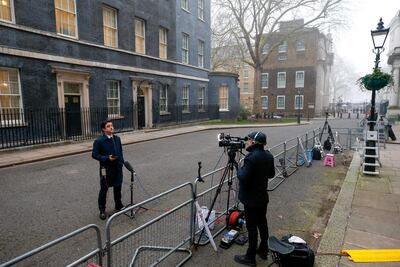
• Sport and culture
A “significant chunk” of a £300m sports recovery fund will help cricket fans return to stadiums this summer, while £2.8m will be earmarked to promote the UK and Ireland’s bid for the 2030 football World Cup.
There will be more than £400m of additional support for the badly hit culture sector, with grants to help museums, theatres and galleries in England reopen once coronavirus restrictions start to ease in the coming months.
• Vaccination support
Mr Sunak gave the country's vaccination programme an extra £1.65bn, with £22m set aside to test the viability of a third dose.
The funding also includes £33m to improve vaccine testing and development to protect against future outbreaks and variants; £28m to expand testing and the country’s ability to scan for new variants, and £5m to create a “library” of Covid-19 vaccines.

Taxes
• Corporation tax
Mr Sunak increased corporation tax to 25 per cent, a move that still keeps the business levy lower than in other Group of Seven nations.
Corporation tax will rise sharply from its current rate of 19 per cent, which is the lowest in the G7. Rates in Canada, France, Germany, Italy and Japan are all above 25 per cent, while the US government proposed earlier this week to lift its rate to 28 per cent from 21 per cent.
However, small businesses will still enjoy the lower 19 per cent rate, thanks to a "small profits rate" for companies with profits under £50,000. It means only 10 per cent of companies will pay the higher rate, Mr Sunak said.
• Income tax
Mr Sunak did not increase the rate, in line with the 2019 Conservative Party pledge not to raise rates of income tax, VAT or national insurance.
However, he will freeze income tax thresholds until 2026 in the hope that putting the brackets on hold will result in more people paying tax as wages increase.
It means while the lowest threshold will be increased to £12,570 next year, it will then be frozen until April 2026. The same will apply to the higher threshold, which will be increased to £50,270 next year and kept at that level for the same period.
The move could push 1.6 million people into a higher tax bracket, including 800,000 who currently pay no tax at all.
• Lifetime allowance
Mr Sunak is also freezing the lifetime allowance - the amount people can save before they incur tax charges.
Considered a stealth tax rise, it means voters could face a 25 per cent tax on any additional income from their pension pot.
“Freezing allowances is a back-handed way of raising taxes, as wage inflation and asset price inflation increase the number of people pushed over the thresholds at which they have to pay more tax," said Becky O’Connor, head of pensions and savings at interactive investor.
“Frozen allowances and thresholds have a habit of remaining fixed for many years, dragging more people into tax charges over time."

• Fuel duty
A mooted increase to fuel duty of £0.50 – the first in almost a decade – was shelved by Mr Sunak, possibly after analysts warned that focusing on fiscal consolidation too early will stifle the economy's recovery.
• Stamp duty and help-to-buy scheme
To keep the property market buoyant in the wake of the crisis, Mr Sunak extended the Stamp Duty Land Tax holiday, first unveiled in July, until the end of June.
Under the tax holiday, the first £500,000 of the purchase price of a main residence in England and Northern Ireland is exempt from SDLT, with the move causing a surge in transactions that sent house prices soaring to an average record high of £252,000 in 2020 – up 8.5 per cent from 2019.
Meanwhile, the tax holiday for properties worth less than £250,000 will apply until the end of September.
Mr Sunak also unveiled a Help to Buy mortgage guarantee scheme to get first-time buyers on to the property ladder by encouraging lenders to provide mortgages to people with deposits as low as 5 per cent on properties worth up to £600,000. The government offered lenders the guarantee they need to provide mortgages covering the remaining 95 per cent.
Building for the future
• Shake-up of London stock market
Mr Sunak set out plans to overhaul the London Stock Exchange (LSE) after an independent review recommended a post-Brexit shake-up of listings rules to lure tech companies to the City.
Mr Sunak published the review findings by former European Union finance commissioner Jonathan Hill alongside his budget, which recommends updating rules around free-float requirements, dual class structures and special purpose acquisition companies to strengthen the UK’s position as a world-leading financial centre.
The move is considered a post-Brexit fightback from Mr Sunak, who wants to help London compete with global centres such as New York, Amsterdam and Frankfurt and lure tech founders to the LSE, after it raised £43bn in equity capital last year.
"The Government has a careful balancing act – to maintain London’s competitive attractions, without losing our standards," said Richard Wilson, chief executive of interactive investor
"Today’s proposals set out some watermarks that we hope will maintain the rights of small shareholders, but they need to be carefully thought through.”
• New infrastructure bank
Around £22bn was pledged for the UK’s new infrastructure bank, set to launch in the spring.
First unveiled as part of November’s spending review, the bank will offer a range of products, including equity, loans and guarantees, which can be tailored to support the needs of private sector infrastructure projects, in areas such as renewable energy, carbon capture and storage, and transportation.
• Sovereign green bonds
Mr Sunak also unveiled the world’s first sovereign green bonds for retail investors – part of the government’s push to create a net-zero-carbon economy by 2050.
It means British savers can buy bonds from NS&I, the Treasury-backed savings organisation, knowing that their money will fund projects in areas such as renewable energy and clean transportation.
Mr Sunak also committed to the launch of so-called green gilts, aimed at institutional investors, as part of his borrowing plans for the 2020/21 financial year, as well the projects he plans to fund from the £1bn Net Zero Innovation Portfolio.
• Green funding
Sticking with the green theme, climate change initiatives included the funding of three green programmes through the Net Zero Innovation Portfolio, with a £70m competition to develop long-duration energy storage prototypes.
In addition, £20m will go towards developing offshore wind demonstration projects, to support the government's bid to generate enough electricity from offshore wind to power every home by 2030, and a further £4m to fund a biomass feed stocks programme to identify ways to increase production of green energy crops and forest products in a decarbonisation boost.

• Small businesses
Small companies were offered free MBA-style management training courses to help them propel productivity levels.
The government also injected £520m into a "Help to Grow" scheme, with free online courses provided by leading business schools and a 50 per cent discount on new productivity-enhancing software.
An extra £126m was pumped into a traineeship scheme, where the government pays employers who give young people work placements.
The government will pay £3,000 per trainee, up from the existing £2,000.
• Boosting start-ups
The new Future Fund: Breakthrough will invest £375m into UK technology companies, a move that will see taxpayers hold stakes in multiple start-ups.
The initiative will see government funds matched by private sector venture capital, a move that could help later-stage companies scale up quickly and cover the heavy costs of research and development needed to get to the next level.
Meanwhile, a new visa scheme will set highly skilled migrants who already have a job offer from a technology business on a “fast track” to obtaining a visa. This will help start-ups and rapidly growing tech firms to source talent from overseas.
• Increase to contactless payments
An increase to the legal limit on contactless payments rose to £100 from £45, offering a boost to the struggling retail sector.
The proportion of debit card payments using contactless has risen to six out of 10 since the onset of Covid-19, from four out of 10 in 2019. Following Britain’s exit from the EU, the country is no longer bound by the £45 cap on contactless payments which applies across the bloc.
• Freeports
Mr Sunak also unveiled the winning for eight freeports to turbocharge post-Brexit Britain. The eight locations in England are East Midlands Airport, Felixstowe and Harwich, Humber, Liverpool City Region, Plymouth, Solent, Thames and Teesside.
Freeports are areas that allow companies to import and export from the UK under simplified customs, tax and planning rules, part of Mr Sunak’s plans to help the country build back from the pandemic, aimed at attracting investment and trade and boosting employment across the country.
"Our Freeports will have simpler planning – to allow businesses to build; infrastructure funding – to improve transport links; cheaper customs – with favourable tariffs, VAT or duties; and lower taxes – with tax breaks to encourage construction, private investment and job creation," Mr Sunak said.
